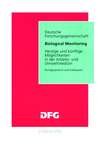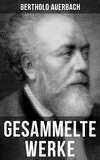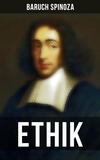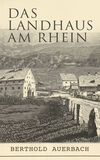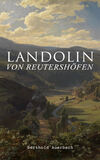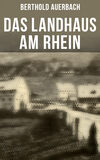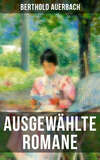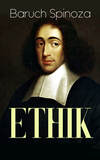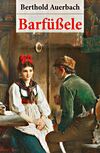Kitabı oku: «Villa Eden: The Country-House on the Rhine», sayfa 16
CHAPTER VI.
A THIRD PERSON
On the day that Eric had left Castle Wolfsgarten, an habitual visitor made his appearance there; this was the son of the eminent wine-merchant, the so-called Wine-count. He came once a week, to play chess with the count. He looked young, but he was worn out in soul, not knowing what to do in the world; he derived no satisfaction from the business of his father, had money enough, had learned a variety of things, was something of a musician, drew a little, had very various talents, but no one predominant. All was wearisome to him; hollow and stale seemed that enjoyment of life which was to be decorously pursued. Wherefore should he devote himself to the restricted limits of some regular pursuit, in order to make money? That is wholly needless. He was a director in several railroads, and for a period it had satisfied him to oversee and to manage, to be saluted respectfully, and listened to obsequiously, by the subordinates held strictly to their place; but that too became distasteful to him. Travelling, too, proffered him nothing further, one had to drag along with himself continually such an extra weight of ennui. He turned a disgusted eye upon the world which had nothing to do for him, and in which he could do nothing. He had cultivated one talent, that of chess-playing, and as Clodwig also took great pleasure in the game, and was skilful in it, he came every week to Wolfsgarten, and played with Clodwig, for it conferred upon him a special regard in his own eyes, and in those of others.
He had also a great reputation, among all those in the neighborhood who prided themselves upon the same qualities as he, of being a rake, and appearing to the world as a gallant. He had a collection of lewd pictures of every kind, and one must be very intimate with him to be able to say that he had seen them all, even to the most carefully hidden. Of course the Wine-chevalier presented a very respectable appearance before the world. No one had ever seen him intoxicated, and, in general society, he always played the part of one very condescending and indifferent, who is yet so noble as to remain in intercourse with these inferior people, as much as to say. One owes that much for old acquaintance' sake. Mothers always warned their daughters of the Wine-chevalier, just as one speaks to children of the wolf howling outside there in the fields, but the mothers themselves did not take it in bad part when he sometimes cast a languishing glance upon them, and even when he frequently said something to them in whispers.
The Justice's daughter, Lina, was not so simple as the mother always said, for she declared that the Wine-chevalier was that transformed manikin in the fairy-tales, who travelled to learn what shivering meant.
The Wine-chevalier of course kept himself fresh in his toilet and his anecdotes, and in everything, externally and internally, that the prevailing fashion required, from year to year, living also for several months in Paris. He did not, like his father, speak of his friend this and the other ambassador, minister so and so, and prince so and so, but he let it be known that he lived in the most inseparable intimacy with the most famous members of the Jockey Club.
The Wine-chevalier always experienced, besides, some degree of pleasure in devoting himself to paying courteous compliments to the virtuous Frau Bella, but she looked at him to-day, as if he were not present, and as if she heard not a word of what he was saying. The count also was so abstracted and absent-minded; that he speedily lost all the games, often gazing at him with wonderment, sitting there in the same chair that Eric had occupied.
A new ally to the Wine-chevalier made his appearance, but this was also of no avail to-day. A corpulent man dressed with fastidious nicety likewise called at Wolfsgarten; he was formerly a famous basso, who had married a rich widow from the neighboring commercial city, and settled down here in this beautiful region. At other times he was well received by Bella, for he sang very agreeably with the remnant of his voice. When he perceived that his greeting to-day was not so cordial as usual, he said that he only came to make a passing call, and Bella was vexed so much the more; she did not like to have Wolfsgarten regarded as a place for casual visits. When both had departed, Bella and Clodwig breathed again freely.
Clodwig went into the cabinet, where he kept the collection of objects that had been excavated from the ground; but all here seemed changed. The urns, the vases, the lachrymatories, swords, necklaces, and many figures in relievo looked so very desolate, and a warrior, only half of whose face in burnt clay could be dug out, wore to-day such a hideous visage.
All looked so forlorn, as if these thousand things, brought out of the darkness under ground into the light, were making their moan to Clodwig: What then are we here for? There is something wanting to us, – a piece to each. And if Clodwig had been able to exhibit his soul with all its emotions, he, the well-regulated, would have had nothing but potsherds to show. Something was wanting to him since Eric rode off.
With closed lips, and restless eyes that seemed to be in search of something, he went all day long through house and park. Bella succeeded at last, in bringing him to say that the ideal of his whole life might have been realized, but that he had strangely wanted the requisite energy. He complained, for the first time, of feeling the hesitancy and timidity of age. He made a pause, hoping that Bella would complete the suggestion, but she kept silence; and in a very roundabout way, he explained that people indulged in many luxuries, and yet not the right ones. Finally he came directly to the point, that he considered it wrong to have permitted Eric to depart, he had long wished for such a man, and he might venture perhaps to say, that he would also contribute to the advancement of the young scholar with the Apollo-form.
The upper lip of Bella quivered, and she said, —
"The captain" – she was going to say, the captain in Goethe's "Elective Affinities," and stumbling over this thought, she continued: – "The captain, – I mean, the doctor, – would certainly consider himself very fortunate. But – we ought surely to speak openly. I have the happiness of a firmly established good name, and we do not ask what people say – "
"Speak out direct," Clodwig said encouragingly, and Bella continued after she had passed a fine pocket-handkerchief over her face: —
"Do you not think that this young man – would often – how shall I express it?"
"Put us into an awkward position?" suggested Clodwig. Bella nodded, but Clodwig had already thought that matter over, and he combated the notion, dwelling upon the consideration of how great an enslavement it would be of the good, if they must omit doing what was noble because the bad committed the basest things under the cloak of deceit.
Bella now advised her husband to send a messenger to Eric immediately, so that he might not enter into any engagement. Clodwig pressed her hand, and went into his study, with an elastic step not often seen in him. He began to write there, but soon came to Bella and said that he could not write, and the simplest thing to do was to order the carriage and drive over at once to Villa Eden.
Clodwig avoided, as a general thing, all immediate connection with Sonnenkamp and his family, so far as it was possible with the intimacy of his brother-in-law there, but to-day nothing was said of this, and they drove off in good spirits.
Frau Bella often drew her veil down over her face and raised it again; she was very uneasy, for she thought over a great many things, and when she noticed the quick beating of her heart, she grasped hastily her husband's hand, saying, —
"Ah! you are so good, so angel-pure! I could never have believed that I should be continually discovering new excellencies in you."
With the utterance of these words aloud, she silenced in some degree the voice speaking within her what she was not willing to acknowledge to herself, – yes, she consciously disowned it. It is an incomprehensible whim, a freak – not of passion, no – how could Bella confess that of herself? It was the freak of an evil spirit! This young man must possess some incomprehensible, bewildering, magic influence! Bella hated him, for he had disturbed the quiet of her husband, and now was attempting to do the same with her. He should atone for that! She straightened herself back; she was resolved to interrupt the childish, enthusiastic plan of her husband by the very means of her going with him, and if Eric did not perceive her opposition, she would acknowledge it in so many words, and thereby induce him to decline.
Entertaining this thought, she looked up again in a cheerful mood, and Clodwig, perceiving it, settled upon a room for Eric, and laid out the new household arrangement.
A new member of the family too was to be added for Bella, as she was to invite Eric's mother to visit them. It was fortunate that Bella had already known her for some time before, and held her in high esteem. Clodwig informed her that the Dournays also were really of the nobility, and their appellation was Dournay de Saint Mort, and that they had dropped the title only at the expulsion of the Huguenots from France, and he would see to it, in case Eric made a suitable marriage, that his title was renewed, – yes, he could probably do more in his behalf.
Bella asked jokingly, whether he might not desire to adopt him as a son. Clodwig declared that he was not disinclined to do so. With a bitter smile, but to all appearance very lively, Bella answered that it would seem very strange for her to have a son only a few years younger than she was herself.
Now the disentombed antiquities danced joyously before the eyes of Clodwig, and indulged in all sorts of antics. Frau Bella, on the other hand, was exceedingly out of humor; it was a perpetual astonishment to her, that her husband felt so deep an interest in these matters. She had not used deception when, the winter before their betrothal, she had appeared to be a cultivated nature, recognizing the more serious depths of existence, and had manifested an interest in the art-productions of the classic age, in the sciences, and in the higher realities of life; she had, in fact, not wilfully misled him, for she had always supposed that every one regarded these as conversational topics, proper subjects for small-talk. And in regard to the study of the historical development of the past and the present, it appeared to her as a tacitly conventional pastime.
She was terror-stricken to perceive that these great thoughts constituted her husband's very life, that he sorrowed and rejoiced in all that related to the world's progress as in family occurrences, and moreover that he was even religious. He did not speak, as she did, of the dear God, but he would remain in devout contemplation at every manifestation of the Eternal Providence, and wherever a contradiction, a riddle, presented itself, he experienced even a degree of feverish disturbance.
Bella did not confess to herself that the whole appeared to her horribly pedantic, like a preacher or a pedagogue; she had not thought that she was to marry a pedantic professor, instead of a live man.
But whether avowed or not, this whole matter of cherishing a so-called higher interest was extremely wearisome to her. Every one plays only his part in life, and who is to regard it in serious earnest? Those poor devils, the scholars and the philanthropists, may do so, if they please, but not a man of a higher station. Now it appeared that Clodwig was ready to break up a regular routine existence, tedious indeed, but yet tranquil and honorable, by the sudden introduction of a stranger. It was pure calumny, when they said of Bella that she had married the count in the hope of becoming soon a rich and attractive widow. The old Head-equerry had looked out for a good marriage settlement, and a certain part of the income of the great estate was retained and invested yearly, which did not go to the heir by the collateral line. As I have said, it was unmitigated slander that Bella had gone to the altar cherishing a hope of widowhood, but to her alarm – she covered it up whenever she became conscious of it – she found herself growing prematurely old by the side of her husband, who was old enough to be her father.
And who knows how much money Clodwig will spend upon this adventurer, Dournay, who has no regular occupation, and besides, is not in favor at court! But the worst is, that this young man, with his confident expectation of success, will wholly withdraw from her the attention of her husband. They will study with one another, and make explorations, whilst thou wilt be sitting all alone, thou, the young and fresh heart that has devoted itself so nobly, so truly, so self-forgetting, to the care of the old man!
Bella was sorely vexed at Eric, because he made her entertain evil thoughts, and suddenly, while looking at her husband, she cried, —
"In God's name! Your lips are white. What is the matter?"
Were her evil thoughts suddenly to be realized? But Clodwig answered, —
"It's nothing. Look! There he stands. What a wonderful form! I fully believe that he is occupied with thoughts of deepest moment, as he stands there dreamily, gazing down at the grass."
The carriage rolled on. Eric heard his name called, and looked in amazement at the husband and wife, who gave him a cordial greeting. He was made to take a seat in the carriage, and Clodwig's glance to his wife said, "Hast thou ever seen a nobler specimen of a human form?"
Eric was asked whether he had accepted definitely the situation, and when he replied in the negative, Clodwig extended his hand to him, and said, —
"You will find a welcome with me."
Nothing farther could be said, for just then Sonnenkamp trotted up on his black horse, and he was extremely glad to be able to salute such visitors; he was very much surprised, however, to see Eric on such intimate terms with them. He rode up to the coach-door, and very joyfully and respectfully welcomed the guests to the villa.
Hardly had they left the carriage, when another drove into the court, and the physician got out.
CHAPTER VII.
THE FIRST ROSE IN OPEN GROUND
Eric acquired an entirely new regard by the arrival of Clodwig and Bella. For the first time Sonnenkamp called him "dear friend."
Herr Sonnenkamp offered his arm to Bella, which she accepted, turning slowly toward him, that Clodwig might see how great a sacrifice she was making; her hand rested lightly on Sonnenkamp's arm. As she was thus walking on, holding the arm of the master of the house, she stopped full of wonder, for there was a rose blooming in full beauty upon a rose-bush raised in the open air.
Herr Sonnenkamp hastened to pluck it, and presented it to her in some pretty words. Bella said that she was very much obliged to him, and seemed not to notice that he again proffered his arm. They went at once to the hot-houses. Joseph, who was always present at the right time, as if specially summoned, received from his master orders to inform Fräulein Perini and Frau Ceres of the visit. Joseph understood.
The doctor had been summoned to Frau Ceres, but when she learned what guests had arrived, she immediately declared that she was well; but she was cunning enough to say to the doctor, that merely seeing him had made her well. Doctor Richard understood.
In the meantime, Clodwig had said to Eric, "You don't remain here; you go with us. I can't leave you."
He jerked the words out briefly and rapidly, as one utters in a compressed, uniform tone something which has lain in his mind for a long time.
Just then, Roland came down the mountain, with his camp-stool and drawing-board, and Bella called out to him, while far off, in a very friendly "welcome."
"How handsome he is!" said she to those standing about her. "He who could fix permanently this image of the marvellous boy as he is coming along, would have a picture out of the Grecian age, by changing camp-stool and portfolio into spear and shield."
Bella perceived the look of happiness in Eric's eyes, and said to him: – "Yes, Herr Doctor, I once gave to an artist at the capital the design for a picture as I saw Roland; he had sprung across the road, and had cast an alms into the hat of a street-beggar sitting upon a heap of stones; and as he sprang back, so well formed and graceful, every muscle stretched, and his countenance so beaming with the delight of beneficence, it was a wonderful sight that can never be forgotten."
Clodwig looked down to the ground; Bella was evidently not aware that it was not she, but he, who had thus seen Roland and given the order to the artist.
Roland was very much surprised at the visit, and the manner in which he was greeted, Bella saying to her husband, – "Clodwig, kiss him for me!" Clodwig embraced the youth, who now turned to Eric with a puzzled look.
"If the Herr Captain remains with us, you must visit us often, dear Roland," said Bella.
Sonnenkamp was at a loss to know what that meant, but the danger of losing Eric seemed immediately to affect the youth, so that he looked up in a help-imploring way. And it was now clear to Eric, what was intended in regard to him, and he now for the first time understood what was interrupted by Sonnenkamp's coming up to the carriage.
They took only a hasty look at the greenhouses, for Bella said that when it was green and blooming outside, the imprisonment of the plants had something oppressive to her.
Fräulein Perini soon appeared, sent by Frau Ceres, to make known her intention not to be sick to-day.
Bella and Fräulein Perini had separated themselves from the men; they had much to say to each other, and Eric was naturally the first subject. Bella could not forbear expressing her surprise to Fräulein Perini, that she had so completely seen through the singular man, although Fräulein Perini had not really yet said anything. But this remark forced her to reply, though nothing of her real opinion was given; for Fräulein Perini said that she constantly felt fresh admiration at the German learned world, meaning to include Bella, who was to be almost looked upon as a learned woman.
Bella took no notice of this equivocal compliment; she assumed a matronly tone, while confessing that she had no near relation to the young men of the day, and was not sure that she understood them. Neither one of the ladies seemed to come out fully with her opinion, and each appeared to regard the other as cherishing a secret inclination for Eric.
"Do you know," said Frau Bella, looking very attentively at the rose which Sonnenkamp had given her, "do you know that this man with the double title has an insultingly low opinion of the female sex?"
"No, I did not know that, but it may be a part of that radical heresy, as Baron von Pranken calls it, which he parades with such manifest conceit."
"But what opinion have you formed about Herr Dournay?"
"I have not formed any opinion about him."
"Why not?"
"I am not impartial; he does not belong to our church."
"But supposing that he did belong to our church, how would you then regard him?"
"It is not to be supposed. This complacent self-assumption is not possible with a person who has subjected himself to the divine law; his deportment is that of a prince travelling incog., or more properly, as Herr Baron von Pranken says, 'the man coaches round the world in a lecturer's invisible chair.'"
The two women laughed. Bella had found out enough. She very carefully impressed upon Fräulein Perini the necessity of exerting all her influence against the reception of a man proud of his unbelief. Fräulein Perini held her cross with her left hand, and looked somewhat mischievously at Bella. Then the countess does not wish to have him here. Is she trying to bring him into her own house, and getting up a nice intrigue against her husband? She hinted, not without mischievous satisfaction, that Herr von Pranken, who had occasioned all this, must also find the proper remedy. Bella gave out also that Eric was, perhaps, unsuitable in another view; and here, for the third time, it was expressly said, that Eric was a "dangerous" man.
Fräulein Perini had spoken of it as applicable, in two respects, to one present and to one absent, for the special interest of Bella had not escaped her penetrating eye.
Quickly, and in order to conceal how well she had hit the mark, she added, that a man like Otto von Pranken had certainly no one to be afraid of. She spoke with sympathizing eagerness of his journey, that perhaps it was imprudent, but one must let the passionate youthful heart take its own course, and it often brought about the right result better than cautious deliberation and consideration. But Fräulein Perini spoke very plainly, and Bella replied as plainly, in condemnation of Pranken's desire to go counter to the social ordinances, but any such tendency must be indulged, though with great reluctance on their part.
Again the conversation reverted to Eric; and Bella was now extremely good-humored. She pitied the man's aged mother, regarded the self-conscious bearing of the youth as in reality timidity; he carried a haughty outside, that he might cover up thereby the menial dependence. An elevation of the eyelids disclosed that Fräulein Perini was slightly hurt, and Frau Bella quickly added, that pious natures are never really oppressed by dependence, for they, have in themselves a higher position, yes, they are through piety constituted the equals of anybody.
Fräulein Perini smiled; she understood how kindly Bella; treated her, and there was no need of the friendly pressure of the hand to make her perceive it.
A servant came, and announced that Frau Ceres would receive the gracious countess in the balcony-saloon; she was not allowed by her physician to go out into the open air.
Fräulein Perini accompanied Bella as far as the outside-stairs, and made there a very polite courtesy; Bella, however, grasped both her hands with irrepressible cordiality, and said that she should like such a friend as Fräulein Perini for daily intercourse; she pressingly urged her to confer the honor of a visit without any delay.
When the rustling of Bella's garments was no longer heard, Fräulein Perini clawed with her little hand like a cat, which, silently lurking, has caught something; contemptuously she opened her eyes, always so veiled, and her small mouth almost uttered the words, —
"You are all deluded."
Frau Ceres complained of her constant suffering, and Frau Bella attempted to console her, saying that she had everything, and especially such splendid children. She knew not which to praise most, the charming attractions of Roland, or the angelic nature of Manna.
Bella seldom came into Sonnenkamp's house, but when she came there, she was always seized by a passion which is perhaps peculiarly a woman's passion. She lived at Wolfsgarten in an abundance which left nothing to be desired, but as soon as she drove through the gate of Villa Eden, an evil spirit came over her; and the demon's name is Envy – envy of this exuberant superfluity, where there was no dragging along under the burden of old lumber and decaying remnants, but everything newly created. And as often as she thought of Frau Ceres, sparkles flashed before her eyes, for she saw then the diamond ornaments of Frau Ceres, such as the reigning princess herself did not possess.
She was thoroughly condescending and gracious to Frau Ceres, and she was happy that she could be condescending. These people can buy everything for themselves, but not a noble, historically famous name; and if the proposal of Otto succeeds, it is only the covering up of lowness with a fresh varnish, which is always begging, "Do not touch me, if you do, I shall rub off."
Eric was here also naturally a prominent subject of conversation, and Frau Bella pressed the rose to her mouth, in order to hide her laugh, when Frau Ceres said, —
"I should like to have the Herr Captain for myself."
"For yourself?"
"Yes. But I don't think I can learn anything more, I am too old and too stupid. He hasn't let me learn anything."
Frau Bella contested very zealously this modesty. Was not Frau Ceres beautiful and young? She might be taken indeed for Roland's sister. Was she not prudent and elegant in her deportment? Frau Ceres smiled and nodded continually, appearing to believe that it was all true. But now Bella felt obliged to take her leave, as she desired to spare the delicate organization of Frau Sonnenkamp.
Frau Ceres looked up timidly at these words; she did not know whether that was praise or blame. Bella took leave, kissing Frau Ceres upon the forehead.
Herr Sonnenkamp had left the count and Eric; he had many things to see after in the house, also letters and despatches had come in, which required an immediate answer. He sent moreover for the Major to dinner, and gave orders that if they did not find him at home, they should go for him to the castle.
Clodwig went with Roland and Eric to their room, and before they were aware, they became engaged so earnestly in conversation that they wholly forgot Roland. The youth sat there dumb, looking sometimes at one, and sometimes at the other. He did not understand what they were saying, but he could feel how much they were enjoying. When Clodwig had retired to his own room, Roland seized Eric's hand and cried: —
"I will also learn, I will also study all, whatever you want; I want to be like you and Clodwig."
A thrill passed through Eric's soul. The invitation from Clodwig was exactly the ideal of all that he could desire, but here was an actual duty of life; he could not choose any longer what course, to take.






